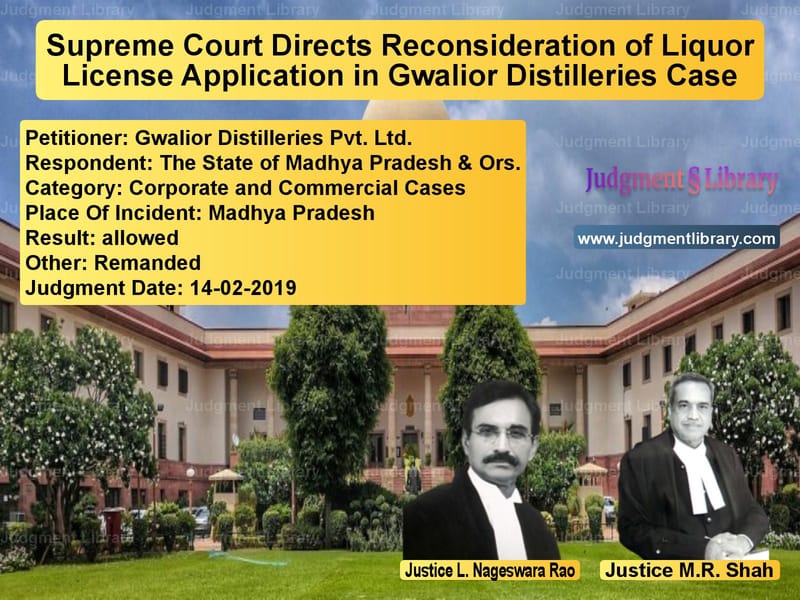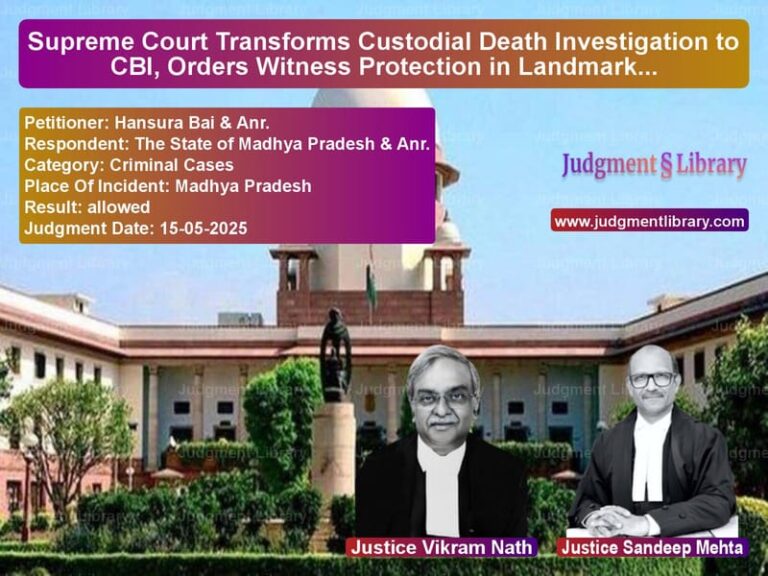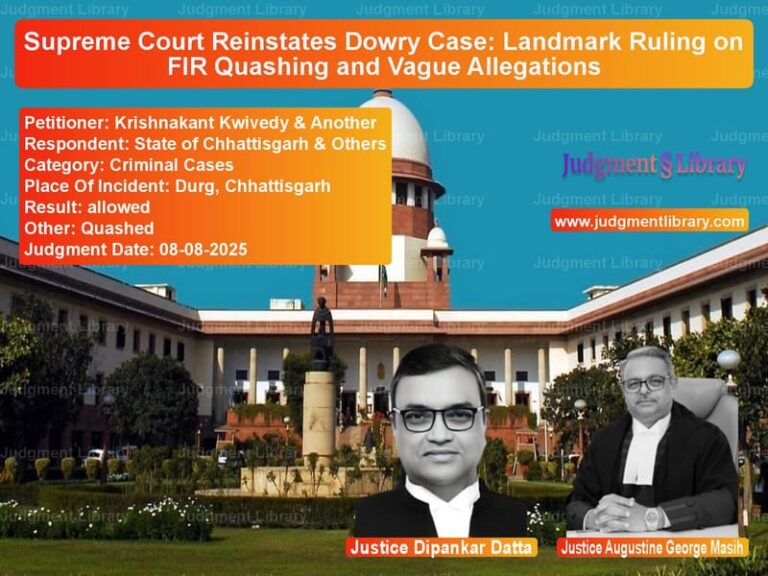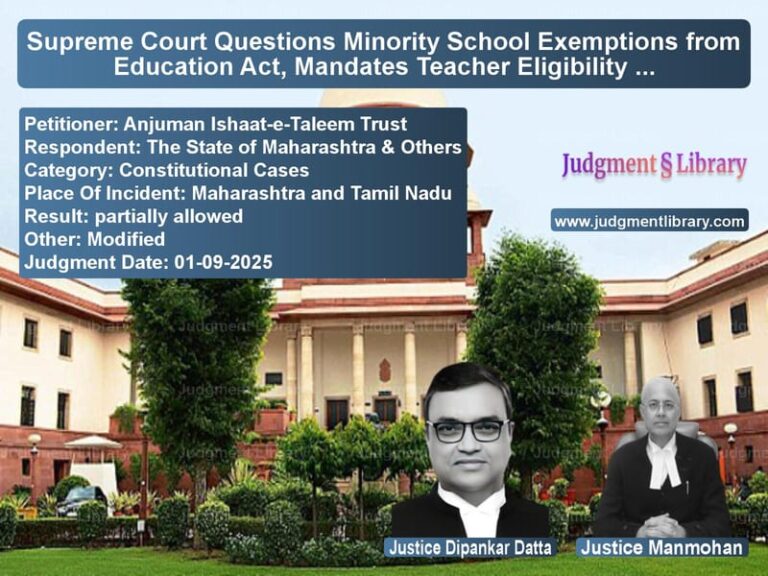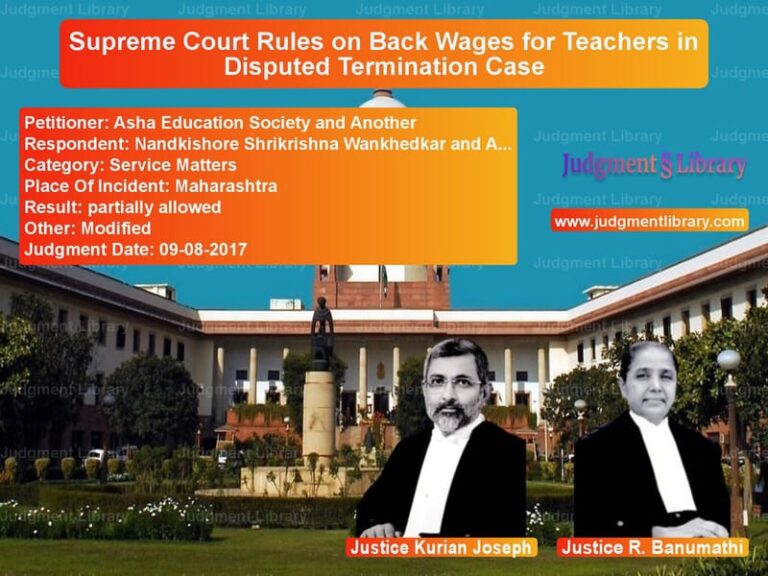Supreme Court Directs Reconsideration of Liquor License Application in Gwalior Distilleries Case
The case of Gwalior Distilleries Pvt. Ltd. vs. The State of Madhya Pradesh & Ors. is a landmark ruling by the Supreme Court of India concerning the grant of liquor licenses and the principles of fair competition in government tenders. The judgment provides clarity on the licensing process under the Madhya Pradesh Excise Act, 1915 and ensures that tender conditions do not arbitrarily disqualify bidders.
Background of the Case
The dispute arose when the appellant, Gwalior Distilleries Pvt. Ltd., applied for a CS-1 license to manufacture, bottle, and wholesale country spirit in Madhya Pradesh. However, the excise authorities rejected the application, citing a tender condition that required applicants to have an existing CS-1 license at the time of bidding.
Challenging this restriction, the appellant filed a writ petition in the Madhya Pradesh High Court, arguing that the condition violated the Madhya Pradesh Country Spirit Rules, 1995. The High Court dismissed the petition, holding that there was no fundamental right to trade in liquor and that the state could impose such conditions.
Dissatisfied with this ruling, the appellant approached the Supreme Court, seeking relief against the exclusion from the tender process and a directive to grant the CS-1 license.
Legal Issues in the Case
- Whether the tender condition requiring an existing CS-1 license was arbitrary and against the provisions of the Excise Act?
- Whether the appellant was denied equal opportunity in participating in the tender process?
- Whether the High Court correctly interpreted the Madhya Pradesh Country Spirit Rules, 1995?
Arguments Presented
Appellant’s (Gwalior Distilleries Pvt. Ltd.) Arguments
- The requirement of an existing CS-1 license was not mandated by the Madhya Pradesh Excise Act, 1915 or the Country Spirit Rules, 1995.
- The appellant was unfairly excluded from the tender process, violating Article 14 of the Constitution of India (Right to Equality).
- Other distillers in similar circumstances were allowed to participate in the tender, demonstrating discriminatory treatment.
- The High Court failed to recognize that the state’s licensing policy should align with statutory provisions rather than arbitrary tender conditions.
Respondents’ (State of Madhya Pradesh) Arguments
- The licensing requirement was a policy decision aimed at ensuring only experienced and authorized manufacturers participated in the tender.
- The appellant had failed to secure the required license before bidding and could not claim unfair treatment.
- The state had broad discretionary powers in regulating liquor trade, and judicial intervention was unwarranted.
Supreme Court’s Observations and Judgment
1. Applicability of Excise Laws
The Supreme Court analyzed Section 18 of the Madhya Pradesh Excise Act, which governs the grant of manufacturing and wholesale liquor licenses. The Court ruled:
“There is no provision in the Act or the Rules that mandates prior possession of a CS-1 license as a condition for participation in the tender process. The imposition of such a condition is arbitrary and contrary to the principles of fair competition.”
2. Equal Opportunity in Tenders
The Court emphasized that while the government has the authority to regulate liquor trade, it must do so fairly. The ruling stated:
“When the state decides to grant a privilege to trade in liquor, it cannot act arbitrarily. The tender process must ensure equal opportunity and must not discriminate between similarly placed applicants.”
3. Errors in the High Court Judgment
The Supreme Court found that the High Court misinterpreted the law by holding that area allotment was a prerequisite for granting a CS-1 license. The Court ruled:
“There is no statutory requirement that an area must be allotted before a CS-1 license can be granted. The High Court erred in dismissing the petition without considering the statutory framework.”
4. State’s Discretion and Article 14
The Court reaffirmed that while the state has exclusive rights over liquor trade, it must act in accordance with constitutional principles. The ruling stated:
“The state’s power to regulate liquor trade does not grant it the liberty to impose arbitrary restrictions. The tender process must be transparent and non-discriminatory.”
5. Directions for Reconsideration
The Supreme Court directed the Madhya Pradesh government to reconsider the appellant’s application for a CS-1 license, stating that:
- The application must be assessed strictly in accordance with the Excise Act and Rules.
- The appellant should not be denied a license merely for not participating in the tender.
- The decision should be taken in a non-arbitrary manner.
Final Judgment
The Supreme Court:
- Set aside the High Court’s judgment that upheld the tender condition.
- Directed the state to reconsider the appellant’s CS-1 license application.
- Ruled that participation in the tender process cannot be a mandatory condition for license issuance.
- Ordered that equal opportunity must be ensured for all applicants.
Legal Implications of the Judgment
This ruling has significant implications for liquor licensing and tender fairness:
- Ensures fair competition: The state must provide equal opportunities in the liquor trade.
- Clarifies licensing requirements: A CS-1 license is not dependent on tender participation.
- Prevents arbitrary conditions: The ruling sets a precedent against discriminatory tender policies.
- Strengthens judicial oversight: Courts can intervene in cases of unfair state policies.
Conclusion
The Supreme Court’s ruling in Gwalior Distilleries Pvt. Ltd. vs. The State of Madhya Pradesh & Ors. ensures fairness in liquor licensing and government tenders. The judgment upholds the principle that state policies must align with statutory provisions and constitutional mandates. By directing a reconsideration of the license application, the Court has reinforced the right of businesses to participate in a fair and transparent licensing process.
Petitioner Name: Gwalior Distilleries Pvt. Ltd..Respondent Name: The State of Madhya Pradesh & Ors..Judgment By: Justice L. Nageswara Rao, Justice M.R. Shah.Place Of Incident: Madhya Pradesh.Judgment Date: 14-02-2019.
Don’t miss out on the full details! Download the complete judgment in PDF format below and gain valuable insights instantly!
Download Judgment: Gwalior Distilleries vs The State of Madhya Supreme Court of India Judgment Dated 14-02-2019.pdf
Direct Downlaod Judgment: Direct downlaod this Judgment
See all petitions in Company Law
See all petitions in Corporate Compliance
See all petitions in unfair trade practices
See all petitions in Judgment by L. Nageswara Rao
See all petitions in Judgment by Mukeshkumar Rasikbhai Shah
See all petitions in allowed
See all petitions in Remanded
See all petitions in supreme court of India judgments February 2019
See all petitions in 2019 judgments
See all posts in Corporate and Commercial Cases Category
See all allowed petitions in Corporate and Commercial Cases Category
See all Dismissed petitions in Corporate and Commercial Cases Category
See all partially allowed petitions in Corporate and Commercial Cases Category

